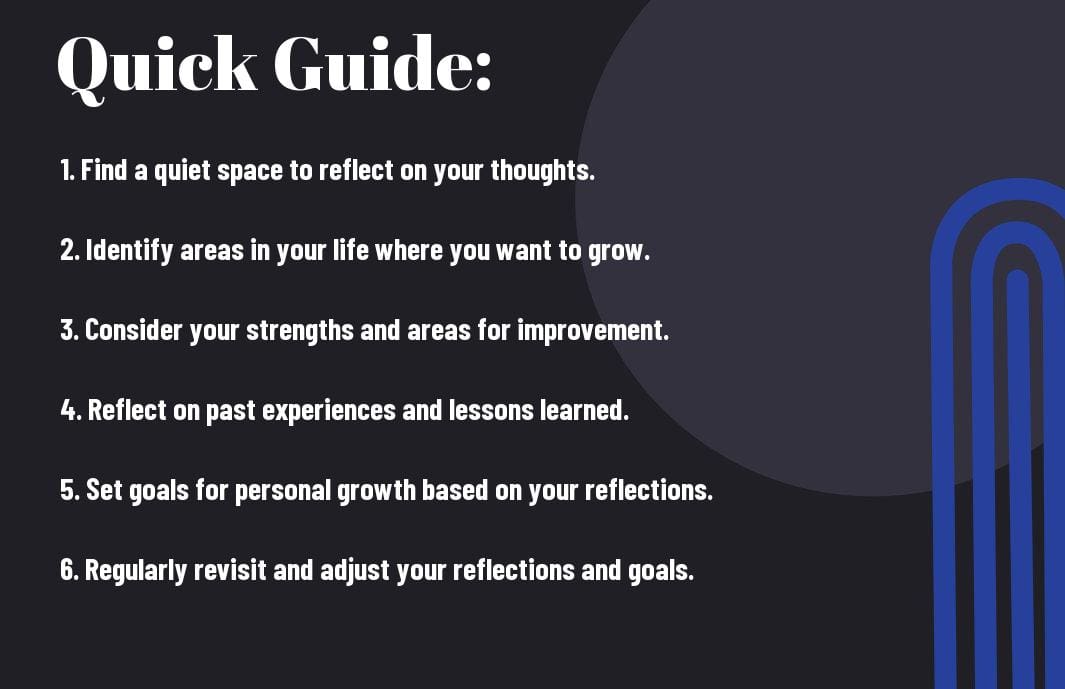Just as a mirror reflects our physical appearance, self-reflection mirrors our inner selves, shedding light on our thoughts, behaviors, and emotions. This powerful tool allows us to pause, evaluate, and learn from our experiences, paving the way for personal growth and self-improvement. By taking the time to introspect and analyze our actions, we can gain valuable insights into our strengths, weaknesses, and values. In this guide, we will explore the importance of self-reflection, provide tips on how to effectively practice it, and discuss the benefits it can bring to our lives. Get ready to launch on a journey of self-discovery and unleash your full potential through the transformative power of self-reflection.
Key Takeaways:
- Increased Self-Awareness: Self-reflection allows individuals to gain a deeper understanding of their thoughts, feelings, and behaviors, enhancing self-awareness.
- Personal Growth and Development: Engaging in regular self-reflection facilitates personal growth by helping individuals identify patterns, set goals, and make intentional changes.
- Improved Decision-Making: By reflecting on past experiences and choices, individuals can learn from mistakes, gain insights, and make more informed decisions in the future.

Understanding Self-Reflection
It is important to understand the concept of self-reflection in the journey of personal growth. Self-reflection is the process of examining one’s thoughts, feelings, and actions to gain insight into oneself. This practice allows individuals to assess their behaviors, beliefs, and values, leading to self-awareness and personal development.
Types of Self-Reflection
Self-reflection can take various forms, each serving a unique purpose in personal growth. The different types include meditative reflection, written reflection, creative expression, critical reflection, and self-assessment. These methods offer individuals the opportunity to investigate into their innermost thoughts and feelings, facilitating a deeper understanding of oneself.
| Meditative Reflection | Connecting with inner self through mindfulness practices |
| Written Reflection | Journaling thoughts and emotions for self-exploration |
| Creative Expression | Exploring emotions through art, music, or other creative outlets |
| Critical Reflection | Evaluating past actions and behaviors to identify areas for improvement |
| Self-Assessment | Assessing one’s skills, strengths, and weaknesses to set personal goals |
Factors Influencing Self-Reflective Practices
Even though self-reflection is a personal endeavor, several factors can influence an individual’s reflective practices. Environment, emotional state, past experiences, mindset, and time constraints play a significant role in shaping the depth and effectiveness of self-reflection. Any external distractions or internal biases can impact the clarity and accuracy of self-assessment.
- Environment – Surroundings can affect the ability to focus and engage in reflective practices.
- Emotional State – Feelings of stress or anxiety can hinder introspection and self-understanding.
- Past Experiences – Previous events and interactions can influence the way individuals perceive themselves.
- Mindset – A growth mindset fosters openness to self-improvement and learning.
- Time Constraints – Limited time may restrict the depth of self-reflection and exploration.
It is crucial to recognize these factors and create a conducive environment for meaningful self-reflection. Addressing any obstacles that impede the reflective process can enhance the quality and impact of personal growth. Any hindrances should be acknowledged and dealt with to promote a more profound introspective journey.

Embarking on the Journey
Step-by-Step Guide to Initiating Self-Reflection
All personal growth journeys begin with self-reflection. This process involves looking inward to understand oneself better, assess past experiences, and identify areas for improvement. Here is a step-by-step guide to help you get started:
| Step 1: | Find a quiet and comfortable space to reflect |
| Step 2: | Set aside dedicated time for self-reflection |
| Step 3: | Ask yourself probing questions about your thoughts and emotions |
| Step 4: | Keep a journal to record your reflections and insights |
Tips to Enhance the Quality of Self-Reflection
While engaging in self-reflection is crucial for personal growth, it is equally important to ensure the quality of your reflections. Here are some tips to help you enhance the depth and effectiveness of your self-reflection:
- Be honest with yourself about your strengths and weaknesses
- Practice mindfulness to stay present during reflection
- Seek feedback from trusted individuals to gain different perspectives
Assuming the habit of self-reflection can be challenging, especially if you are not used to introspection. However, making a conscious effort to incorporate this practice into your routine can significantly impact your personal growth journey. Any resistance or discomfort you may initially feel is a natural part of the process and should not deter you from continuing.
For instance, being brutally honest with yourself during self-reflection may unearth some uncomfortable truths. Embracing these insights, no matter how difficult, is imperative for real growth. It’s crucial to remember that self-reflection is a tool for self-awareness and improvement, and the discomfort is a necessary step towards positive change.
Navigating Challenges
Common Obstacles in Self-Reflection
Now, self-reflection is a powerful tool for personal growth, but it is not without its challenges. One common obstacle is fear of facing uncomfortable truths about oneself. It can be daunting to confront our flaws, mistakes, and weaknesses, but doing so is crucial for growth. Another obstacle is lack of time or commitment to regular self-reflection. In our fast-paced lives, it can be easy to prioritize other tasks over introspection.
Pros and Cons of Self-Reflective Practices
| Pros | Cons |
| Increased self-awareness | Emotional discomfort |
| Enhanced personal growth | Time-consuming |
| Better decision-making | Can be challenging to confront truths |
| Improved relationships | May lead to feelings of vulnerability |
Now, understanding the pros and cons of self-reflective practices can help individuals navigate this powerful tool more effectively. The key is to recognize that while self-reflection can lead to increased self-awareness, personal growth, better decision-making, and improved relationships, it can also bring about emotional discomfort, be time-consuming, challenging to confront truths, and may lead to feelings of vulnerability. Balancing these aspects is crucial for a successful self-reflective practice.
Sustaining Self-Reflection
Integrating Self-Reflection into Daily Life
Your journey of personal growth relies heavily on the consistent practice of self-reflection. There’s immense power in making self-reflection a daily habit. Set aside a few moments each day to ponder over your actions, thoughts, and emotions. Create a journal to jot down insights gained through this process. By incorporating self-reflection into your daily routine, you pave the way for continuous improvement and self-awareness.
Measuring Personal Growth Through Self-Reflection
Some may wonder how to gauge personal growth through self-reflection. It is important to set measurable goals and track your progress. Reflect on your past experiences, decisions, and reactions, and assess how you have evolved. Keep a record of areas where you have shown improvement and areas that still need work. Self-reflection acts as a mirror reflecting your growth journey. Celebrate your achievements and use setbacks as learning opportunities to propel yourself forward.
Personal growth through self-reflection is not a destination but a continuous process. Embrace the discomfort that comes with confronting your shortcomings and use it as fuel for growth. Stay committed to introspection, and be open to feedback from others. Self-awareness is key to unlocking your full potential and living a purposeful life. Note, personal growth is a journey unique to each individual, and self-reflection is your compass guiding you towards becoming the best version of yourself.
Conclusively
Self-reflection is a powerful tool for personal growth that allows us to gain a deeper understanding of ourselves, our actions, and our goals. By taking the time to reflect on our experiences, emotions, and behaviors, we can make positive changes in our lives and work towards becoming the best version of ourselves. Incorporating self-reflection into our daily routine can lead to increased self-awareness, improved decision-making, and enhanced personal development. So, make self-reflection a priority in your life and watch as you unlock your full potential and achieve your goals with greater clarity and purpose.
FAQ
Q: What is the importance of self-reflection in personal growth?
A: Self-reflection is crucial for personal growth as it allows individuals to gain insight into their thoughts, feelings, and behaviors. By taking the time to reflect on our experiences, we can identify patterns, strengths, and areas for improvement, leading to self-awareness and ultimately, personal development.
Q: How can one start practicing self-reflection?
A: To begin practicing self-reflection, find a quiet and comfortable space where you can be alone with your thoughts. Set aside dedicated time each day to reflect on your goals, actions, and emotions. Consider journaling, meditating, or simply sitting in silence to connect with your inner thoughts and feelings.
What are the benefits of incorporating self-reflection into daily routine?
A: Incorporating self-reflection into your daily routine can lead to numerous benefits such as improved self-awareness, increased emotional intelligence, better decision-making skills, and enhanced personal growth. By regularly reflecting on your experiences and behaviors, you can gain valuable insights that will help you navigate challenges and reach your full potential.




